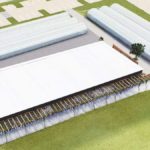Feed aggregator
Cape Cod: eight great white sharks seen feeding on humpback whale carcass
- Expert marvels at ‘biggest smorgasbord a shark could dream of’
- Researchers monitor unusual humpback mortality event
For those aboard a recent whale watching cruise off Cape Cod, the decomposing carcass of a year-old humpback calf floating in the waters of the Stellwagen Bank national marine sanctuary made for a heartbreaking sight.
Related: Experience: I was attacked by two sharks at once
Continue reading...Regional voters reject gas led recovery, support investment in renewables
 New survey confirms that some of the Morrison government's most ardent supporters of coal and gas are largely out of step with the views of their own electorates.
New survey confirms that some of the Morrison government's most ardent supporters of coal and gas are largely out of step with the views of their own electorates.
The post Regional voters reject gas led recovery, support investment in renewables appeared first on RenewEconomy.
Over-50s want climate crisis addressed ‘even if it leads to high prices’
Research finds almost two-thirds of older people want UK government to move faster on green initiatives
The majority of over-50s believe the UK government should be doing more to address the climate crisis, even if it leads to higher prices, a study has found.
A survey of more than 500 people aged 50 and over found that almost two-thirds want ministers to move faster on climate initiatives, regardless of whether it meant products and services would be more expensive over time, or more difficult to access.
Continue reading...Fortescue to invest another $1 billion in renewables, green hydrogen after windfall profit
 Fortescue Metals to invest another $1 billion in renewables division, and will push its customers to tackle their 250 million tonne emissions footprint.
Fortescue Metals to invest another $1 billion in renewables division, and will push its customers to tackle their 250 million tonne emissions footprint.
The post Fortescue to invest another $1 billion in renewables, green hydrogen after windfall profit appeared first on RenewEconomy.
Japanese eco-tourism resort taps ClearVue solar glass for greenhouse
 ClearVue to supply its patented solar glass technology for use in a greenhouse at a high-profile eco-tourism and "wellness" project in Japan.
ClearVue to supply its patented solar glass technology for use in a greenhouse at a high-profile eco-tourism and "wellness" project in Japan.
The post Japanese eco-tourism resort taps ClearVue solar glass for greenhouse appeared first on RenewEconomy.
Redflow in running to deliver its first megawatt-hour battery in Australia
 Brisbane-based zinc bromine flow battery maker named in request for tender for a job that could mark its first megawatt-hour scale job in Australia.
Brisbane-based zinc bromine flow battery maker named in request for tender for a job that could mark its first megawatt-hour scale job in Australia.
The post Redflow in running to deliver its first megawatt-hour battery in Australia appeared first on RenewEconomy.
This bird's stamina is remarkable: it flies non-stop for 5 days from Japan to Australia, but now its habitat is under threat
Sun Cable: World’s biggest solar and battery project is about to get a lot bigger
 Sun Cable is to announce a significant expansion to what is already the world's biggest solar and battery project, and will deliver first output to Darwin in 2026.
Sun Cable is to announce a significant expansion to what is already the world's biggest solar and battery project, and will deliver first output to Darwin in 2026.
The post Sun Cable: World’s biggest solar and battery project is about to get a lot bigger appeared first on RenewEconomy.
Extinction Rebellion activists glued to Science Museum site in Shell protest
Demonstrators attach themselves to railings in reaction to museum taking funding from oil firm for Our Future Planet show
Extinction Rebellion protesters have glued or locked themselves to the railings inside the Science Museum, in a protest against the oil firm Shell’s sponsorship of its exhibition about greenhouse gases.
Five people have put their arms through the railings and glued their hands together so they are not damaging the museum’s property. Six have deadlocked their necks against the railings. Some of them are scientists, dressed in lab coats, while others are in clothes with Extinction Rebellion logos.
Continue reading...Greece's deadly wildfires were sparked by 30 years of political failure | Yanis Varoufakis
The climate emergency and state neglect caused this disaster
After the second world war, Greece’s countryside experienced two debilitating human surges – an exodus of villagers, then a most peculiar human invasion of its fringes. These two surges, aided by a weak state and abetted by the climate crisis, have turned the low-level drama of naturally redemptive forest fires into this summer’s heart-wrenching catastrophe.
After heatwaves of unprecedented longevity, wildfires across the summer months have so far destroyed more than 100,000 hectares (250,000 acres) of ancient pine forests. They have blackened swathes of Attica, scorched parts of ancient Olympia and obliterated north Evia’s magnificent forests – whose rural communities lost their homes, not to mention their livelihoods and landscapes.
Continue reading...Could you spot a grampy pig? Schools could soon offer natural history GCSE
Course would aim to instil love of wildlife in teens and inspire them to protect it. Plus: test your knowledge with our quiz
What is the difference between a weasel and a stoat? Can you name five native UK woodland flowers? What birds are considered lowland heathland specialists? Teenagers could be challenged on these questions as part of a natural history GCSE, which could be announced in the coming weeks.
If plans go ahead, it would be the first GCSE to be introduced since a reformed computer science qualification in 2014. The 21st century is creating a lot of work for technology geeks and nature enthusiasts alike, and schools need to create a generation of youngsters who will be up to the challenge, argues producer and nature writer Mary Colwell.
Continue reading...The Observer view on the pros and cons of deep-sea mining | Observer editorial
There may be merits to mining the seabed, but investing in alternative green technologies on land should be the priority
Deep-sea mining has become one of our planet’s most divisive problems. By stripping the ocean floor of its vast mineral wealth, proponents say we can obtain the cobalt, manganese, nickel and copper we urgently need for the green technologies – the electric vehicles, batteries and wind turbines – that must replace our carbon-emitting cars, power plants and factories. The only alternative to these deep-sea sources lies on land, where a huge expansion of mines would trigger environmental havoc: more sinkholes, devastated wildlife and polluted soil and groundwater. It is therefore time to plunder the riches of the deep to save our planet’s smouldering landscapes, it is argued.
These proposals are rejected outright by many scientists and green activists who say the colossal deep-sea dredging that would be involved in raising these minerals would trash swaths of ocean floor and wipe out precious, slow-growing animals and plants, while clouds of toxic sediments would be sent spiralling up from the deep, destroying marine food chains in the process. Deep-sea mining will only worsen our ecological woes, they maintain.
Continue reading...Brown coal output hit record low in Victoria, as renewables reach 72% of demand
 Generation from most polluting technology in Australia's grid - brown coal - hits record low on Saturday as renewables grabbed major share.
Generation from most polluting technology in Australia's grid - brown coal - hits record low on Saturday as renewables grabbed major share.
The post Brown coal output hit record low in Victoria, as renewables reach 72% of demand appeared first on RenewEconomy.
Farmers manage more than half the country. We all have a stake in them getting it right
If you eat, you have an interest in farming. If you care about the environment, you have an interest in farming. Yet Australia has no national agriculture strategy
Strip away modernity. Unlearn everything you know about the complexity of your average day. The ordinary interaction, the workaday worries, the pinging of your phone, the relentless roll of the inbox. You are left with the human condition. Our most basic needs, as the American psychologist Abraham Maslow noted, are the physiological needs: food and water, sufficient rest, clothing, shelter, health and reproduction.
In Australia and much of the developed world, we often forget that food and water are central to the human story. Food is so plentiful, so present, it is not even secondary.
Continue reading...Solar keeps on getting better: Cheaper, more efficient and bigger returns on energy
 The energy payback time for solar PV can be less than a year, meaning it will produce 20 times the energy needed to produce it over a 20 year lifespan.
The energy payback time for solar PV can be less than a year, meaning it will produce 20 times the energy needed to produce it over a 20 year lifespan.
The post Solar keeps on getting better: Cheaper, more efficient and bigger returns on energy appeared first on RenewEconomy.
We’re smart enough to solve climate challenge with technologies we already have
 Renewables offer cheaper and smarter options than fossil fuels across the energy spectrum. The answers are with us already.
Renewables offer cheaper and smarter options than fossil fuels across the energy spectrum. The answers are with us already.
The post We’re smart enough to solve climate challenge with technologies we already have appeared first on RenewEconomy.
Does feeding garden birds do more harm than good?
Single-use plastic plates and cutlery to be banned in England
Polystyrene cups will also be banned but campaigners say action to cut plastic waste is ‘snail-paced’
Single-use plastic plates and cutlery, and polystyrene cups will be banned in England under government plans, as it seeks to reduce the plastic polluting the environment.
A public consultation will launch in the autumn and the ban could be in place in a couple of years. The move was welcomed by campaigners, but they said overall progress on cutting plastic waste was “snail-paced”, with the EU having banned these items and others in July.
Continue reading...


